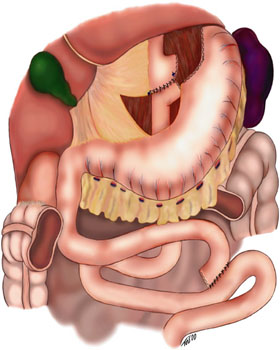As part of our ongoing Kansas City weight loss series, we would like to share a little history for those interested in Kansas City Gastric Bypass procedures. The following information was written by the Obesity Coverage group in an article titled, “The Experts Guide to Gastric Bypass”. It provides an illustration of the evolution of the Gastric Bypass procedure since the first bypass performed in 1954. We’ve come a long way in perfecting the Gastric Bypass procedure and believe many will find this information to be helpful and informative. Please keep in mind, though, that the type of bariatric surgery recommended by our surgeons for any patient of The Bariatric Center of Kansas City is always determined based on the unique medical facts related to the patient’s health history. Gastric Bypass surgery may be a more suitable option for some, but not all patients. Keep searching our site for more information on Laparoscopic Gastric Bypass. Feel free to discuss this surgical option further with your Bariatric Surgeon to gain a better understanding of whether it’s the right bariatric procedure for you.
The first two approaches for weight loss surgery were significantly different. One used restriction techniques that limited calorie intake. The other used malabsorption techniques which kept the calories from being absorbed by the body. First attempted in 1954, the second technique resulted in nutritional deficiencies. Because of this, different procedures including Duodenal Switch, Gastric Bypass, and Bilio Pancreatic Diversion were developed. By incorporating restriction and malabsorption, the risk of nutritional deficiencies was reduced as well as the stomach size, limiting the amount of food intake.
The first Gastric Bypass surgery was performed at the University of Iowa in 1967. According to the article, the history was a journey of momentous efforts, modified almost five decades, ultimately leading to today’s laparoscopic gastric bypass, which “has been performed hundreds of thousands of times. Its outcomes have been studied, its risks and benefits evaluated, and often covered by insurance.”
The benefits of Gastric Bypass surgery.
- You will lose weight. On average, you will lose 70% of your excess body weight in the first 18 months after surgery. * This study shows 77.5% of excess weight loss after 18 months. (Journal Of Obesity, 2013)
- You will not be able to eat large meals (restricted pouch/stomach size).
- You will get sick from eating too much sugar and/or carbs (dumping syndrome).
- You will absorb less calories from food (bypassed intestines).
- You will improve and/or eliminate type 2 diabetes.
- Medication for high blood pressure and/or high cholesterol may be eliminated.
- Your hormones may adjust from significant weight loss, increasing testosterone and improving metabolism. (ASMBS)
- Long term weight loss success – most studies show that 90% of patients maintain at least 50% of excess weight loss after surgery.
original article – http://www.obesitycoverage.com/the-experts-guide-to-gastric-bypass/#history
photo – https://en.wikipedia.org/wiki/Gastric_bypass_surgery









